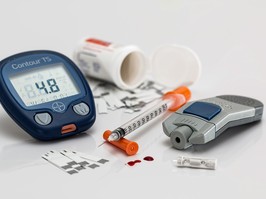have diabetes complications? don't worry, you can still work out — with a modified approach
if you live with diabetes-related complications, such as neuropathy and foot sores, you might wonder if you can safely exercise. the answer is yes!

lower blood sugar, improved blood pressure, and better heart health are just a few of the positive results of leading an active lifestyle. but if you live with diabetes-related complications, such as neuropathy and foot sores, you might wonder if you can safely exercise. the answer is yes! first, talk to your health-care team about how exercise may affect you. then consult with an exercise professional who has experience working with people with diabetes complications.
“starting ‘low and slow’—that is, with a low intensity and progressing slowly—is always the best approach for beginning exercisers with diabetes complications,” says sara hodson, a certified clinical exercise specialist and founder of vancouver-based live well exercise clinics. after her clients start their exercise program—which she creates according to their specific needs—many of them report a renewed quality of life, while others find that their newly active lifestyle gives them the stamina to attend more social functions and that they experience better-quality sleep. hodson says, “one client, who lives with neuropathy, was proud to tell me that she had changed her kitchen faucet by herself. think of the strength, flexibility, and confidence it takes to get down on the floor under the sink to do that.”
advertisement
your exercise needs will differ depending on the complication you are dealing with. hodson offers these suggestions for common diabetes-related complications:
peripheral neuropathy
challenge: diabetes-related nerve damage causes a loss of feeling in your arms, hands, legs, and feet, increasing your chances of losing your balance and falling.
challenge: diabetes-related nerve damage causes a loss of feeling in your arms, hands, legs, and feet, increasing your chances of losing your balance and falling.
choose: non-weight-bearing activities, such as stationary cycling, swimming (with proper water shoes to protect your feet), and seated dumbbell exercises (for example, biceps curls and lateral raises). “if you have trouble holding dumbbells, use resistance bands instead to avoid dropping a dumbbell on your toes,” says hodson. “yoga and tai chi are also good choices because they teach muscle control and fluid movement patterns, which decreases the risk of injuries and foot sores.”
autonomic neuropathy
challenge: dizziness is a common symptom when there is damage to the nerves that control involuntary functions such as blood pressure, temperature control, and digestion. in these cases, it is important to avoid moving quickly from lying to sitting, and from sitting to standing.
challenge: dizziness is a common symptom when there is damage to the nerves that control involuntary functions such as blood pressure, temperature control, and digestion. in these cases, it is important to avoid moving quickly from lying to sitting, and from sitting to standing.
choose: cycling on a recumbent stationary bike (which provides full upper body support and helps to maintain a healthy blood pressure), pool exercises (with proper water shoes to protect your feet), and seated dumbbell or resistance band exercises.
advertisement
foot sores
challenge: corns, calluses, warts, and blisters should be treated by your doctor, as they can develop into open sores that become infected. walking can irritate foot sores, while swimming with a foot wound can increase the risk of infection.
challenge: corns, calluses, warts, and blisters should be treated by your doctor, as they can develop into open sores that become infected. walking can irritate foot sores, while swimming with a foot wound can increase the risk of infection.
choose: exercises that allow you to stay off your feet. seated chair exercises are an excellent option, as is an upper body ergometer, sometimes called an “arm bike,” which lets you sit comfortably while your arms move pedals.
do you have a story about the difference physical activity has made for you and your health? please let us know at dialogue@diabetes.ca
did you know?
if you are not sure how to get started or have concerns about exercising with diabetes, there are strategies that may help you. to learn more, visit benefits of physical activity.
if you are not sure how to get started or have concerns about exercising with diabetes, there are strategies that may help you. to learn more, visit benefits of physical activity.
this article appeared in diabetes dialogue.
disclaimer: this section has been written/provided by diabetes canada with the goal of educating canadians. the content on the website is intended for educational and informational purposes only. the content is not intended to provide medical advice and, to the extent that medical advice is required, users should consult with qualified medical professionals.
 3 minute read
3 minute read





